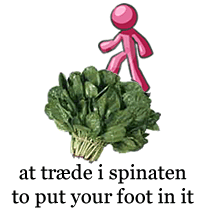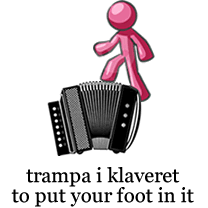
A few posts ago I wrote about an interesting Swedish idiom – trampa i klaveret – to make a social mistake, put one’s foot in it, or literally “to step heavily on the accordion”.
Today I learnt the Danish equivalent – træde i spinaten (“to tread in the spinach”). For example, jeg har virkelig trådt i spinaten (“I have really trod in the spinach”) = I really put my foot in it.
Accoriding to Den Danske Ordbog, træde i spinaten means “utilsigtet sige eller gøre noget dumt” (to accidentally say or do something stupid).
Another version is træde/trampe i spinatbedet (“tread/tramp in the spinach bed”) [source].
Then there’s the spinatfugl or “spinach bird”, which is apparently a person who writes reviews or other cultural material in a newspaper without a journalistic background [source].
Does anybody know why such a person is known as a spinach bird?
The word spinach comes from the Middle English spinach, from Anglo-Norman spinache, from the Old French espinoche, from the Old Occitan espinarc, from the Arabic إِسْفَانَاخ (ʾisfānāḵ), from the Persian اسپناخ (ispanâx).
Apparently spinach cinema refers to “Movies that are not very exciting or interesting, but that one feels one must see because they are educational or otherwise uplifting.” [source]
Are there any interesting spinach or other vegetable-related idioms in other languages?





